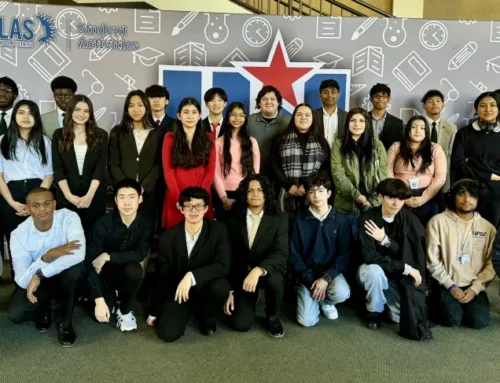Below is the transcription of Episode 11: Sometimes the ‘best’ school isn’t the best fit for your child. Listen to this episode on our website or using the podcast app of your choice, and please subscribe to The Uninformed Parent to support this podcast production and be the first to be notified of new episodes.
Rachael Lieck Bryce has two children. Her daughter is in college and her son is in elementary school. Finding a school to fit his needs proved to be a difficult process. The family lives in Wynnewood North, but as Rachael’s son entered kindergarten, they transferred him into Rosemont Elementary in Kessler Park, a well regarded Oak Cliff school. Unfortunately, her son’s strong-willed nature led to multiple suspensions at Rosemont. By the end of the year, the behavioral issues overshadowed his brilliance and the situation seemed bleak, but it turned out that the right fit was just around the corner. It’s a story that illustrates what may seem like the best school, isn’t always best for your child.
Rachael Lieck Bryce: Any families that have kids that are hard and are not the kids that will just sit down and do what they’re told and stay in their seat and stay in line our story was one that I was willing to share. He’s really tough. He’s really tough. He is brilliant. He is very smart. He can sit with adults at a table and hold a full on conversation. He can look at things and figure out solutions to problems that others might not even come up with. So, he is truly amazing and very, very smart. He is also very strong willed. He has a very strong opinion on what he deems right and what is not right. That presents some very specific challenges for him. He easily is overwhelmed by things and his level of sort of anxiety of a 7, 8-year-old is sometimes disheartening as parents.
So his story is basically this — when he was around 3 and a half was when we moved to Oak Cliff, and he started at the Kessler School in their pre-K program. It’s a private school. He spent two years at the Kessler School, and one of the things that we found was, the director at the time — who is no longer there, so I cannot speak to the current atmosphere of the Kessler School — but when our son was hard or would hit overwhelm or there would be behavior issues, she would just simply send him home. Well, if you want to go home, that’s a terrible solution. So, I could predict the days where I’d get the call at the studio saying, “You need to come pick up your son,” because that morning he would tell me, “I don’t want to go to school today.” That began a really tumultuous relationship with the school.
Keri Mitchell: So, by the time he’s in kindergarten, you’re thinking, maybe something different.
Rachael Lieck Bryce: So, by the time he was finishing up his last year of pre-K, we were absolutely thinking something different. We had heard that Rosemont Elementary had a dual language program, and that it was a really great school, and if you were not zoned for that district, you could get in on a lottery. So, we started that process and our son did in fact get in. Our son did not want to leave the Kessler School. He had what he considered his best friends there. We learned that big transitions, while hard for most kids at 5-years-old, proved to be above and beyond a massive hurdle and sad challenge for our son. And so he spent the first, let’s call it the first semester, very angry and very sad. Sadness and anxiety comes out as aggression in our son.
So, on day three of his first year of kindergarten, we got the inevitable phone call from the vice principal, [saying] “You need to come up to the school and meet with us.” In that meeting, we were told that, you know, I can’t even remember what happened. There was some sort of aggression that came out and, you know, talking about how much he has talked about how much he hates the school, and this, that and the other. And of course, we started trying to explain, he is really sad to be here. He wants to be back at his old school, and this is going to be a real hurdle and challenge for him. We are hoping that you guys will be able to help with that. We are doing everything that we can at home, you know, to make sure that we are supporting that.
The kindergarten teacher said on day three — day three of kindergarten — “Well, I have done everything that I possibly could do,” and we just thought, oh crap! We are really screwed! If on day three of kindergarten you have done everything possible that you could possibly do for this kid, and you don’t even know him yet … what a bad omen. This will be a tough year. Luckily, I will say that we did have a gentleman, a counselor guy who we had worked with him at the time, and he started expressing that [our son] had been publicly identified in his previous school as the troublemaker and the bad kid. That’s something really hard to get over and is probably going to take a lot of time, patience and love and tender care and the right people to do that.
Rosemont was not the school for him. That kindergarten year was really tough. He spent the first semester hating on Rosemont. He got in trouble many times. So, our son got suspended from Rosemont Elementary as a kindergartener. I think it was two or three times. One of the times he got suspended was because he took what the kids call “chalk rocks,” which is basically a limestone rock where you can use it as chalk and you can write on something. And so, he wrote on the school — probably nothing legible, you know, in kindergarten, they don’t have great spelling. But nonetheless, he wrote on the school with the chalk rock and was told that he had defaced the school and would be suspended for defacing the school. We almost laughed as parents, although we tried to be respectful and of course talked to our son about how, please don’t do that. That is not acceptable. It’s disrespectful.
So, the year went on, and after the first semester, we saw a dramatic improvement. So, there were less times that he was in trouble and more times where he was doing a pretty nice job. That also totally parallels with now starting to like the school, finding friends, joined one of the soccer teams. He became much more integrated and dramatic improvements until …
So, we’re on the last day of school. On the last day, they go to Peter Piper Pizza in Oak Cliff to let the kids have sort of a free-for-all, right? And so we’re there and there’s another mother of a son at Rosemont who sort of seems very anxious and worried. And I was like, “What’s, what’s, what’s happening?” And she starts talking to me about, “Have you gotten the email yet?” And I’m like, “What are you talking about? What email? Should I be waiting for something?” And she goes on to tell me that you will get an email today that says whether or not your son’s transfer is renewed or denied. And my heart just dropped.
So I started inquiring, well, what are some of those things? She said, “Well, parent involvement.” I’m like, OK, check. We’ve been super involved. We have donated to the school. We have given monetarily and our time. We have participated in everything we can participate in, obviously, in hopes of trying to get our son acclimated to this environment. And grades. Grades need to be good to stay in as a transfer student. We thought, OK, our son is super smart. He’s got really high test scores. Alright, OK check . Then, behavior. Oh man … we go throughout the day and I get home and I’m getting more and more anxious by the minute. Come 3 o’ clock or just thereafter, after all the administration has left the building, you get the email on the final day of school. It says, “Transfer denied.”
Keri Mitchell: What did you do?
Rachael Lieck Bryce: Well, I sobbed, as I might start crying now thinking about it. I sobbed, and then I hit pure freak out mode. As you know, as a parent, if you’re going to try to get your kid into any school that is appropriate for them, whether that be public or private, June, whatever day that is, you’re up a creek. There are no options. And because I was not actively seeking and looking, I didn’t even know where to start with schools. And as mentioned, you know, my son’s super smart but has some real struggles and some real hurdles. So it’s not like any school, just any school is going to be the right fit for him. So, we were devastated. Then of course, we’re also thinking about the emotional devastation of our son who has only only in the last three months finally come around to actually having some pride … only to then be told, “No, sorry. We’re going to start again.”
Keri Mitchell: So where did you start?
Rachael Lieck Bryce: Well, the first place we started was where most people start, which is in denial. That other mom I spoke of, she also got denied, so we were able to call and cry and try to get some sort of semblance of a plan together. Plan A: appeal. “This cannot be right. We’re very involved parents, and please, please, please look at semester two, not semester one, for behavior. Please try to see the major improvements that we’ve made. We know it was a really rough start.”
Keri Mitchell: How’d that go?
Rachael Lieck Bryce: Well, it didn’t. That appeal proved to be a total horse and pony show. While we were there, I learned that there were boys that were being kicked out for special needs, that were being kicked out for low reading scores and behavior, which is of course our box. That was really devastating. It was tough to see. It was a really sad thing actually. But being the woman that I am, I refused to accept no for an answer and refused to accept defeat. So I called and I forced a second appeal meeting and really, in my heart of hearts, I thought, this is going to work. That proved to be another horse and pony show. There were, you know, 20 pages of pre-printed materials of, go look at these other schools. I shook the principal’s hand leaving that meeting, and she told me point blank, she could be as selective as she wants to be. I was so devastated.
Keri Mitchell: Did you even want to be there after all this?
Rachael Lieck Bryce: That’s a great question. No.
Keri Mitchell: Why did you fight so hard?
Rachael Lieck Bryce: I fought so hard because I felt like it would be another devastating blow for my son three years in the running, trying to help this kid who I know has these successes. Excuse me.
Keri Mitchell: Take your time. It’s fine.
Rachael Lieck Bryce: We just have to find the right place and the right people and the right resources. And we felt like we were on track to do that. So that day, my daughter, who is one of her little brother’s other cheerleaders, reminded me of a hard time that she had had going into second grade, and how you never knew when the thing that was around the corner that seemed like the unknown could actually be the answer.
Keri Mitchell: Wow.
Rachael Lieck Bryce: And [she said] that I needed to have some faith in that. Then that same day, coincidentally, as I was sitting outside sobbing, that very lovely man, Brian Davis walked by, our president of the neighborhood at the time, and he said, “Rachael, first of all, stop being upset. Have you even called Botello?” He reminded me that we have just been rezoned, and that I needed to not shed any more tears over Rosemont and that I needed to move forward and go meet with Botello.
Rachael Lieck Bryce: So, I called and I got the principal, her name is Dr. Sotelo. (Since then, she has actually been promoted because she was — is — fantastic.) I called Dr Sotelo on that day. You know, again, I couldn’t hold my tears back. There’s a few serious triggers and my children are one of them. It was immediately clear that this woman got it.
Keri Mitchell: Wow. How did you know? What did she say?
Rachael Lieck Bryce: Well, I started telling her my story, the one that I’ve told today, and she didn’t know me before, and in her response to me, it was so clear that she immediately understood my son. [She] got a very clear visual picture as to what his journey had been thus far and had no doubt that they could help him and most importantly would welcome him with open arms.
Keri Mitchell: Wow.
Rachael Lieck Bryce: That was something totally new. I remember day three at Rosemont, they had done everything they could do. This woman hadn’t even met my son yet, and she was 100 percent confident in their abilities as the administrators, the teaching staff and the school as a whole.
Keri Mitchell: At what point in the summer is it now?
Rachael Lieck Bryce: We’re towards the middle to end of June because we’d had the first appeal. I think [the first appeal] was like a week and a half or two weeks after school was over, and you got that, you know, doom and gloom email. Then, I think it was a week or two after that. Then, I had the meeting that second appeal meeting and so, you know, what it may have been towards the end June. And of course, they’re all about to go on leave, as they well deserve.
Keri Mitchell: And so you caught her just in time?
Rachael Lieck Bryce: So, I caught her just in time. Also, before I got her on the phone, I spoke with the vice principal at the time, Ms. Puente, and we had just a second of conversation before she put me on the phone with the principal and then of course had that conversation. She reassured me and said that they would be back, and we would meet before the August date of starting school so that I could feel comfortable. We just sort of went blindly. It was unknown because we had just been rezoned. And because it is also the diamond in the rough. You know, you’ve got schools in Oak Cliff that are winning the popularity contest like Rosemont and Hogg. This is the dark horse, the underdog, the diamond in the rough. So, we just sort of went blindly, and to be completely honest, in part because we had no other options. I’ve only had this one phone call that made me feel really good about it. And of course my husband and I dug and dug and looked at report cards. And low and behold, we see that Botello actually blows those popular schools’ grade cards out of the water. In fact, their grade card in Dallas ISD is amazing. Yet, no one was really looking at this school. They also are an AVID school, which is a school that starts trying to gear kids towards success from day one towards whether their path is going to be college or trade or military. They start trying to figure out as early as possible how to get those kids on success. It wasn’t considered a choice school yet. Although this year, they have now been awarded a Choice School for [Personalized] Learning, which is perfect for our son — and most kids. Not every kid learns in the standardized path that Texas is on. Most really require individual learning. Not every kid learns the same, how to read, how to write, how to do arithmetics,, how to have social skills. It is a very individual process.
I digress.
So we are now a few days before the meet the teacher night, and I’m calling again and back in panic mode. I haven’t actually told my son yet. I just decided that, at the time, I felt like that would make for a really long summer, and that it just wasn’t going to do him any justice. I don’t know if that was the right answer or not, but it’s what I did.
Keri Mitchell: You do what you have to do.
Rachael Lieck Bryce: Here was sort of the amazing part. I mentioned that I had, you know, a less than one minute conversation with the vice principal, but she picked up the phone the day that I called. She remembered everything about me, and that was another thing that just stuck out to me like, oh, this woman cares enough to know who I am and who my son is, which is more than what I could say for the two schools he had previously been at. I think they barely knew who my son was most of the year other than the immediate people that had to deal with him. And that just sort of struck a note with me. She said, “Look, it’s going to be fine. Just take a deep breath. Come to meet the teacher night.”
So, we’re on our way to meet the teacher night a few days later, and it’s just my son and I. Of course my husband has been pulled into some last minute business meeting.
Keri Mitchell: Of course.
Rachael Lieck Bryce: So here we are. I tell my son, look, you know — he’s, he’s not happy. He is sad, and I just let him know that I can’t fix that, but what I can do is be by your side. So, we walk in and immediately notice how clean the school is. It’s kind of a new facility, which is kind of nice, because growing up with my daughter, we certainly had plenty of schools where the trailers were, you know, the standard classroom.
Keri Mitchell: The portables.
Rachael Lieck Bryce: Botello is a beautiful campus and is relatively new and has a beautiful auditorium and it’s just sort of expansive. It feels nice. So, that part felt really great. So, we sit down in the auditorium and the opening ceremonies and talking about how you’re going to pick up your child and all that. Well, it was 100 percent in Spanish, so that was a surprise. It was a surprise. And my son is looking at me, and I’m looking at him. He’s like, “I don’t understand,” you know, and I’ve mentioned my strong-willed smart son who definitely speaks his mind freely. I just kind of looked at him. I’m like, “It’s going to be fine, it’s going to be fine.”
Keri Mitchell: At that point, what are you thinking?
Rachael Lieck Bryce: At that point, I am sort of freaking out. I’m like, “It’s going to be fine, it’s going to be fine. I know it’s going to be fine,” and you know, more than anything, I’m trying to keep face value for my son. And I see Dr. Sotelo looking at me, and I can tell that she’s like, “It’s going to be fine,” trying to send me subliminal messaging. So, everybody gets up and exits the auditorium and goes off to where they’re headed. My son and I wait for her, and she and the school counselor walk up to me. I just kinda looked at her and I was trying so hard to hold myself together, but as you can tell through this interview, when it comes to my sweet son, it’s tough. And I just look at her and said, “I don’t speak Spanish.” And at that point, I just started sobbing, and of course my son looks at me, he’s like, “Mom, are you OK?” I’m like “I’m fine, I’m fine, I’m going to be fine.” And Dr. Sotelo just kind of puts her hand on my shoulder and she says, “You’re gonna be fine.” And the school counselor, of course, sees my son’s shirt, which is a Star Wars shirt. And she immediately starts to speak his language, says, “You a Kylo Ren fan or Luke Skywalker? What do we got here?” And he kind of looks her up and down. And he’s like, OK, maybe I’ll talk to you, which was a nice moment. And he looks at her and says, “Of course, Kylo Ren.” She said, “Yeah, I know. I see what you’re going for there.” And so they get into this beautiful conversation. He immediately starts kind of opening up and feeling a little more at ease. And I just thought, yeah, this might be OK.
They care enough to immediately start trying to figure out who we are as people and trying to speak our language, whatever language that may be, physical, mental, actual language. Dr Sotelo takes us to our new classroom, and we are greeted by some people, Ms.Carnevale, and the thing that is clear immediately is how well equipped they are. And then Ms. Douglas, who ended up becoming his other first-grade teacher. It became super clear that they would be able to guide our son and get him to success. Fast forward, that year ended up being pretty good. The success that our son had and the steps forward that he had were tremendous.
Keri Mitchell: How are you navigating with other parents, the language barrier?
Rachael Lieck Bryce: Many if not most of the parents are bilingual, and they have welcomed our son with open arms more than either of those other two schools ever, ever did. So we are forever grateful. This school year has started off a little rocky only because our son has a hard time with transitions. They’re in it for the long haul. And they will figure out the success for our son, and they will never stop trying. With that, I can’t say enough about this diamond in the rough that is the unknown, the underdog, but is performing above and beyond.
Keri Mitchell: Happy tears now?
Rachael Lieck Bryce: Yeah. Yeah.
Keri Mitchell: Thank you.
Rachael Lieck Bryce: Thank you very much, Keri.
Thanks for listening to The Uninformed Parent. In the next episode, we’ll talk to another Wynnewood North mom who is exploring Botello for her children and wondering if more of her neighbors will begin choosing the high-rated school.
This podcast is a production of Advocate magazines with music by HookSounds.[/vc_column_text][/vc_column][/vc_row]





